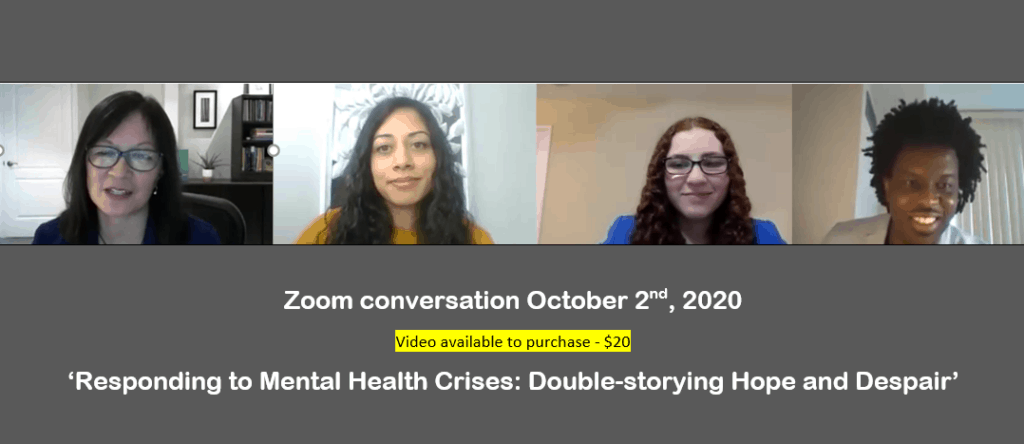Talking about Alternatives to Police Involvement in Mental Health Crises
Talking about Alternatives to Police Involvement in Mental Health Crises
Event Date:
November 6, 2020
Event Time:
10:00 am
Event Location:
This is an ONLINE EVENT
A second online conversation with Rachel Bromberg and Asante Haughton
Recently on October 2, 2020 Rachel and Asante (co-founders of Reach Out Response Network) were interviewed about their advocacy work in relation to alternatives to police intervention when someone is in a mental health crisis. If you missed this event we are pleased to let you know that on Friday November 6, 2020 from 10-11 AM we are hosting a second Zoom conversation with Rachel and Asante.
- All registrants to the Nov. 6th event will be provided with a link to the video recording of the Oct 2 conversation
- If you are unable to join the Nov 6th zoom you can still purchase the video to view

In the video:
~ What are the roles of peer support workers in relation to mental health? [8 minutes 22 seconds]
~ Asante, when referring to police brutality states ‘It’s really sad that these conversations have been elevated as a result of highly publicized deaths. Because I don’t think that should be the bar at which we set what is harm and what isn’t harm.’ [20 minutes]
~ Rachel shares ‘The Toronto police get 10,000 suicide calls every year. We’ve heard a lot of stories about someone feeling suicidal, where police have shown up and lead them out in handcuffs in front of their neighbors, in front of their friends, in front of their family, put them in the back of a police car. And then many end up sitting in an emergency room for hours with police by their side, which is very humiliating and embarrassing and stigmatizing, and often very traumatic for people.’ [26 minutes 28 seconds]
~ Outsider witness reflection from Lindsay who ends part of her reflection saying ‘I like the point that Asante made about the struggle doesn’t need to be lonely …’ [28 minutes 35 seconds]
~ Asante talks about race and racism and how it relates to the topic of alternatives to policing and his own lived experience. [45 minutes 42 seconds]
~ Discussion about ‘the system is more interested in symptoms and stabilizing’ versus ‘a person’s story and healing’. ‘The system is often about figuring out the place to put someone’… [59 minutes 7 seconds]
~ Outsider witness reflections from Rory and Hamilton from Melbourne Australia. ‘We’re many miles away, but something that’s really heartening is knowing that we can connect with people across the globe who share different attitudes on a number of things, but still fundamentally share the same conviction too.’ ‘When I hear globally about people’s experiences of policing in mental health, it really reminds me that you could make a very convincing argument that the mental health system is just an extension of the carceral system’. ‘We did a conference talk on policing in mental health crises in December. Since then in Australia, we’ve had eight police incidences and media won’t touch it. So I think just ramping this up in our own context will be something that we’ll be doing as a result of all of the conversations you are having. Thank you for having them. We’re not having them here.’ [1 hour 8 minutes]
~ Asante emphasizes that we can not address mental health if we can not talk about the impact of racism. ‘They are linked like Siamese twins, you just can’t get away from it’. [1 hour 23 minutes 48 seconds]
~ Talking about ‘Survivance’ – “Wherever there are stories of hardship, there are also stories of resistance to this hardship that continue to sustain us” [1 hour 27 minutes 46 seconds]
~ Questions and reflections from online participants. [1 hour 44 minutes 26 seconds]
Prior to the November 6th 10 AM zoom please view the video and bring your questions and reflections for Rachel and Asante.
This online event via Zoom will be relevant to service providers who are working alongside persons experiencing mental health difficulties. It will also be of interest to peer support workers in other parts of the globe seeking an alternative to police involvement in mental health emergencies.

About Rachel and Asante…
Rachel Bromberg is the Canadian National Coordinator of the International Mobile Services Association, which is a service providers’ network connecting individuals across Canada and the United States who are building civilian-led mobile crisis services in their communities. Rachel is a member of the Toronto Regional Human Services and Justice Coordinating Committee and the Centre for Addiction and Mental Health’s Constituency Council. She is currently completing a dual degree in law and social work (JD/MSW), and she has been working as a peer supporter and peer educator for the past seven years at organizations such as Stella’s Place, CAMH, Planned Parenthood, the LGBT Youth Line, and the Canadian Suicide Prevention Service. Currently, Rachel is doing a summer internship with the CAMH Legal Department.
Rachel’s personal and professional experiences have catalyzed a deep interest in and passion for community-led mobile crisis services. She is invested in leading the way in a paradigm shift away from police response to mental health crisis towards a truly anti-oppressive, trauma-informed, community-based, and client-centred response that will promote individuals’ dignity, autonomy, self-determination, and resilience. When Rachel isn’t planning transformative systems change or world domination, she enjoys reading, Pilates, running at the beach, and spending time with her adorable (and incredibly assertive) six-year-old sister.
Passionate about social justice and equity, Asante Haughton is a national award winning mental health advocate dedicated to endeavours aimed at building stronger communities. He is a peer worker, poet, thinker and speaker who believes in people, global inter-connectivity, and positive personal change.
Asante’s peer work has brought him across Canada, to the United States, Colombia and most recently, Ireland. Asante has also made noise as a two-time TEDx speaker and he was recognized by CAMH as one of the top 150 Difference Makers in mental health in Canada. Finally, Asante was featured in the most recent Bell Let’s Talk prime time documentary special.
When not trying to save the world, Asante can be found laughing at his own jokes, Netflix’ing, checking his fantasy football stats, watching cartoons, and being frustrated with Toronto sports teams. Though Asante can be pretty laid back, he is loud about his advocacy and drive for change as he aims to deliver a message of social awareness, justice, community betterment, and above all, hope.
Learn more about the Reach Out Response Network here
Registration fee includes video recording* of the Oct. 2nd interview with Rachel Bromberg and Asante Haughton and revenue will be donated to Reach Out Response Network
*link and access to video will be available until November 22, 2020
